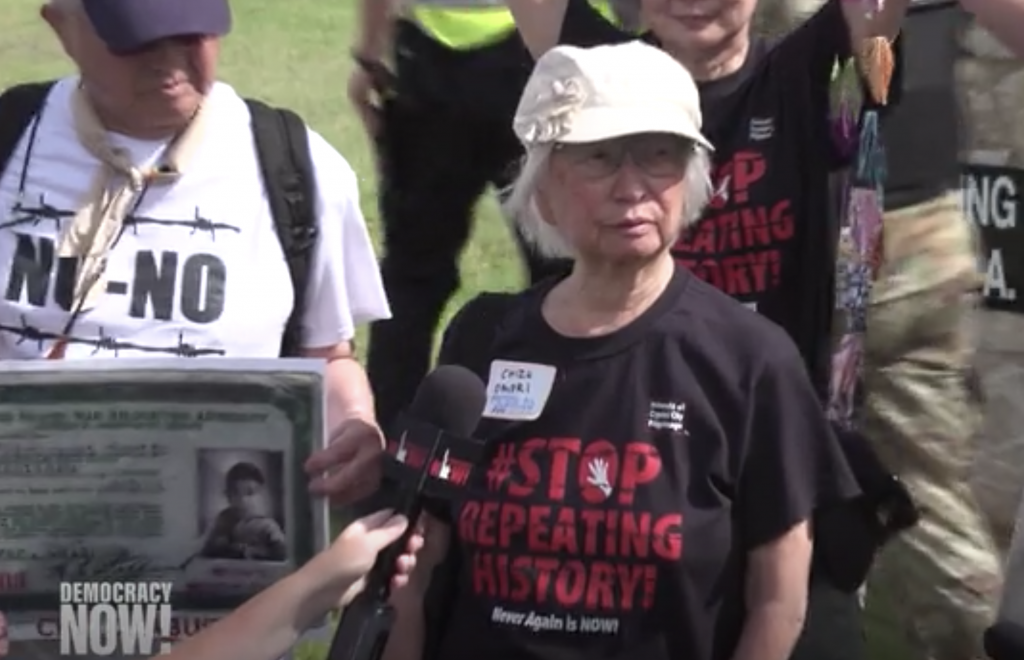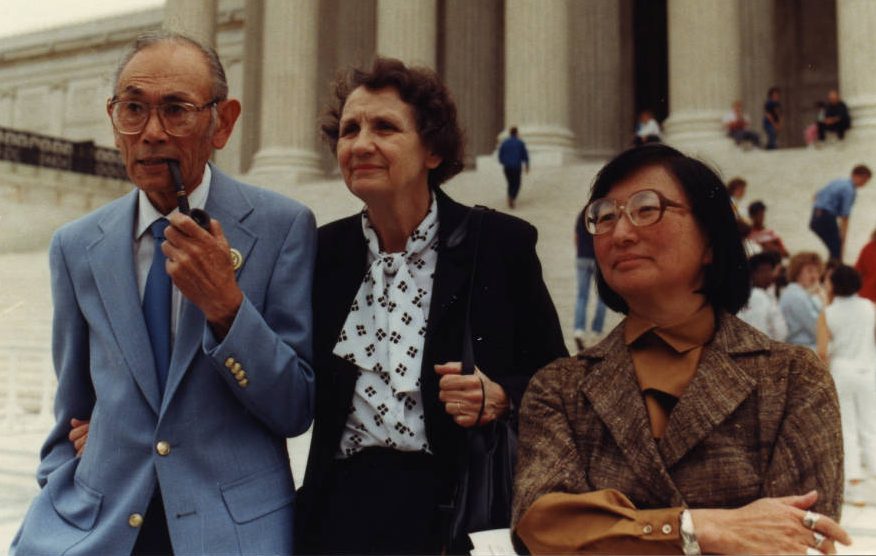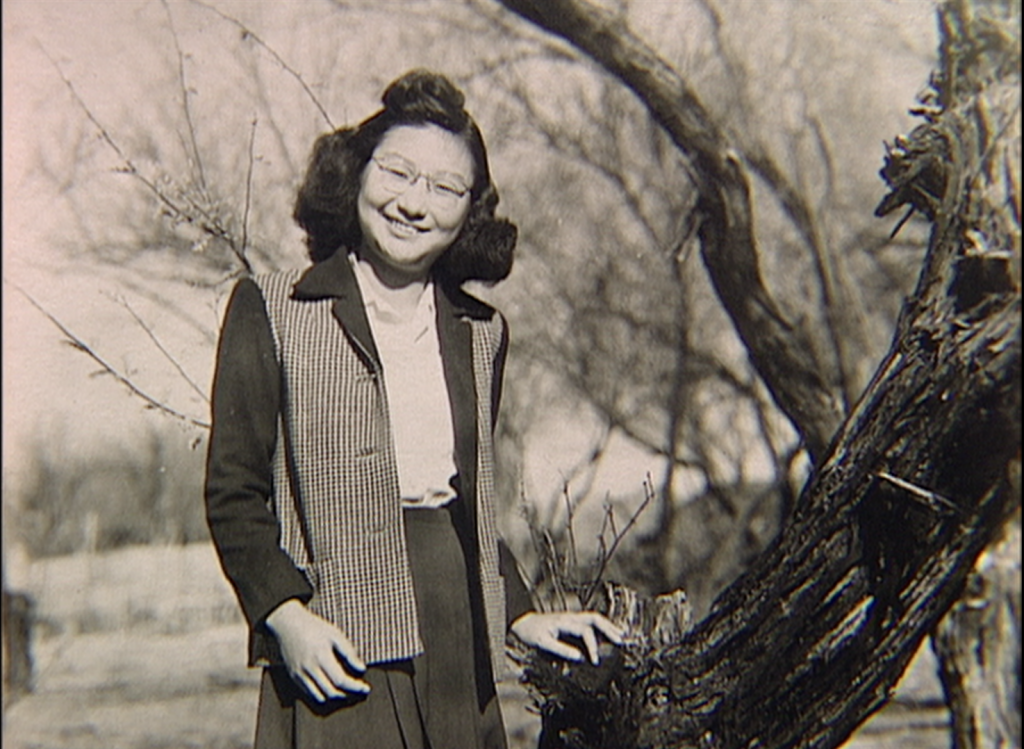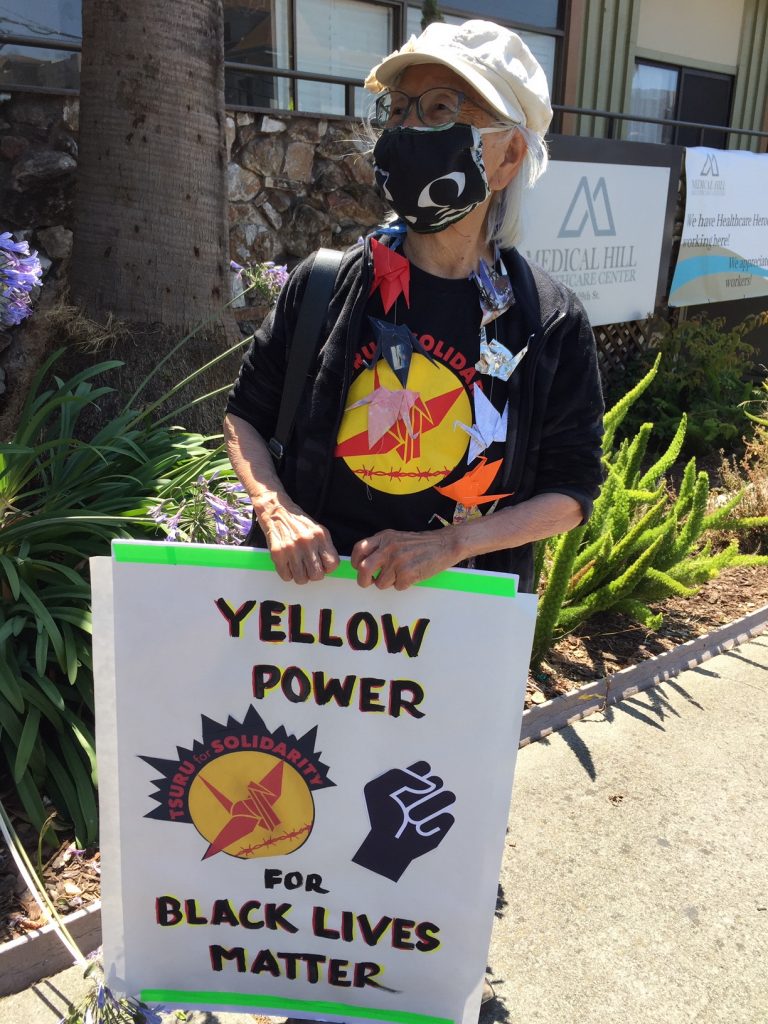March 18, 2021
Activist and filmmaker Chizu Omori has spent most of her life advocating for the rights of marginalized peoples. And at the age of 90, she shows no sign of slowing down. Even through the past year of the pandemic, she has shown up to weekly Black Lives Matter protests in Oakland and countless Zoom meetings as part of her work with Tsuru for Solidarity. Densho communications and public engagement director Natasha Varner caught up with Omori when she was just days away from being fully vaccinated against COVID to talk about her involvement with the redress movement and her ongoing activism.
(For more on Omori’s WWII experience and her work as a filmmaker, see the two oral histories Densho conducted with her in 2011 here and here.)
Natasha Varner: I want to spend a moment talking about your camp experience, if that’s okay, since many of our readers won’t be familiar with that. You had just turned 12 when your family was forced to leave your home and move to Poston. In your redress testimony you write, “I was old enough to realize that something extraordinary was happening, but not old enough to comprehend the true nature of it.” That must have been so disorienting for you, particularly at that age — can you say more about what was going through your mind at that time?
Chizu Omori: I mean, almost everybody must have felt that there were great splits within the community on various lines, you know, the main one became called “loyal” or “disloyal.” And then the generational lines of the younger people kind of being pitted against the older generation. And I was aware of other splits, like, the people who came from rural areas, versus the city people. And all these things were sources of irritation because we’re all living very closely together and you had time on your hands. And conflicts of this sort going on at various levels, you know, and then on top of that is kind of a semblance of normalcy. I mean, there’s school and church and social events and athletics, and all these things going on.
NV: And so what was it like for you after you and your family were permitted to leave camp and return to Los Angeles?
CO: The weird thing, at least for me, was that I started going to high school, and it was, as though nothing had happened. And I could fit into this American school system very easily because I was a really good student. I fell in with a group of really bright Jewish kids in high school in Los Angeles and they were very politically sophisticated. And so that was another thing separating myself from the other Nisei. And when I got into civil rights I used to think about Japanese Americans, that you all have gone through this terrible experience and I would like for you to be more empathetic about civil rights, you know, and they seemed to be very indifferent or timid and so I kind of looked down on them as you don’t seem to learn from your own experience.
I understand now why they were hesitant to, you know, be outspoken. So, that was a wedge for me, away from them. And then [in college] being an English major I could mix easily with leftists. The kind of people that I was running around with were left wingers and in Berkeley you could meet every stripe of left wing, moderates to radicals, and so these people were much more interesting to me.
NV: In your redress statement, you also talk about having an emotional disconnect from your memories of camp as a sort of coping strategy. Was there a particular moment or event that triggered this “shroud-like covering,” as you put it, coming off so that you could begin to reconnect with those memories on a more emotional level?
CO: [In college], I was running around with intellectual types and they were more aware of our history than I was at the time and they would say to me, “what was it like?” and I would say, “oh, it wasn’t so bad.” And I just sort of dismissed it at the time. But then some of them would say, “Well, you know, you were like, early adolescent, those are formative years and probably a lot of changes were happening.” So I started to self examine, at that point and when the Asian American yellow power, and all that stuff came along, it was a natural course. I lived in the Bay Area for a long time, then I moved to Seattle and I lived a long time there. These were areas where, I guess you could say, they’re bubbles where there was a lot of freedom to say things and do things that were just not true in most of the other parts of the country. Even moving to Seattle, that Asian American community up there was quite unified and that’s why, you know, redress was a big thing, big deal in Seattle, because we had allies.
NV: Can you talk about how you came to get involved in redress and why it was personally meaningful for you to be a part of that movement?
CO: I was in Seattle and there were a bunch of these very good people — they were smart, on the ball. They were inclusive and when the movement got started I was invited to one of their meetings. So, yeah, I immediately signed up. We worked for 10 years. That was a long haul, but it just felt like the right thing to do. The whole community was not behind us, we were aware of that, so I figured that it had to be an educational process — that even if we didn’t get very far, or achieve any kind of success, the point is that this is something that people ought to know about. And so that was my primary goal in working on redress, just educational, you know, because by that time, I guess I really had a pretty good understanding of what a gross violation [WWII incarceration] was of the laws of the United States.
With my civil rights work, I really began to understand better, and I just remember thinking, you know, it was not nothing and the greater public should be made aware of what the government can do, and has done to minority groups. Here’s the beaten down group getting itself together to make an effort and that was very gratifying. It took a lot of time, because people had to be persuaded that their voice mattered, that their stories mattered, and that this is a vehicle for them to express themselves.
NV: You’ve been active in Tsuru for Solidarity’s efforts to rally support for immigrant justice from the beginning — you were at the first big protest at the Dilley detention facility, you were at Ft. Sill later that same year, and now you serve as part of the core steering committee. What has participation in that movement meant to you?
CO: There’s a lot of power in organizing like this. I have always felt that coalitions of non-white peoples is the way to get a seat at the table to to get our issues heard and attended to in some way. And so we’re really beginning to roll in those directions. And I think that it’s just, you know, built into the history of our country that most of us didn’t know, what a racist basis that the whole country was built on.
So now, because we’re such a multiracial, multicultural, multiethnic population, we need to get more sophisticated in demanding equal rights and justice before the law. I hope that in this COVID period, when there’s been so much turmoil, along with Black Lives Matter, and now the trial in the death of George Floyd is starting today. These issues are very much on the minds of a lot of people and I just hope that all this is a big educational push for people and will become an incentive for everybody to get involved and work towards more equality.

NV: As someone who’s been involved in various activist movements for decades now, does this historical moment feel different than others?
CO: I mean, if you’re going to ask me what I’m thinking about it’s like, man, we almost lost our democracy. You know, supposing Trump had won the last election, I just don’t know what would have happened to the country. And so we are getting to a kind of a basic struggle, which transcends a lot of these other issues. Voter suppression and the kind of white nationalism that we’ve seen… there are elements in our country which are, well, they want to keep the country white, let’s face it. I wish they could understand that equal rights doesn’t mean a diminishing of their rights, [and] many of us believe that everybody has equal rights. And so it’s getting to feel very elemental. Like you either believe it, or you don’t, and it’s hard to win.
I’m alarmed about the state of national politics. But I’m very heartened by the numbers of young people who are getting active. Depending on the day, sometimes I feel really good about things and sometimes I feel really pessimistic about things, but I think that’s a sign of our times. I think we live in very turbulent times, overlaid by the pandemic and so it just feels like, you know, nothing is really dependable. Yeah, day to day.
—
Blog header: Chizu Omori (far right) with Fred and Kathryn Korematsu on the steps of the Supreme Court, April 20, 1987. Image courtesy of CSU Fullerton Center for Oral and Public History.


